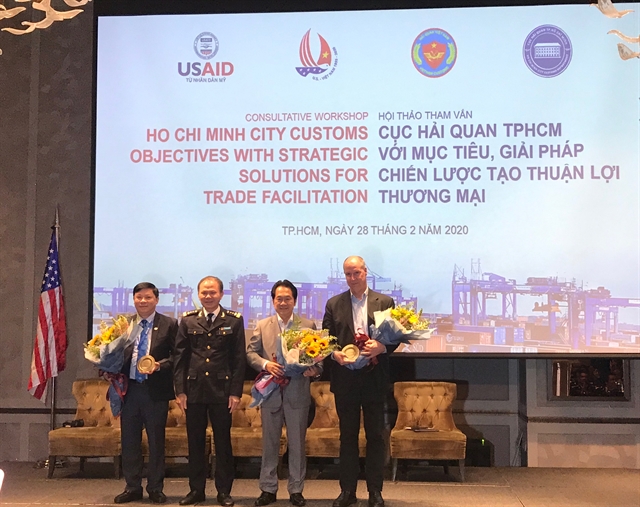 Economy
Economy


|
| The logistics industry needs further reform, experts tell a conference in HCM City on February 28. - VNS Photo Việt Dũng |
HCM CITY – The logistics industry in Việt Nam, especially HCM City, continues to face challenges like red tape and traffic congestion near border gates despite progress made in facilitating trade, Đinh Ngọc Thắng, head of the city Department of Customs, told a conference yesterday.
The Government had been issuing many policies to facilitate trade by improving the business climate and businesses' competitiveness, he said, but admitted that the logistics sector faced "too many inspection procedures" and "the inspections themselves take too long, sometimes up to a week."
Besides, standard regulations had not been issued yet for some products, he said.
"International trade takes place mostly through one fourth of Việt Nam's entry points, and congestion is worsening as trade increases," he said.
Vietnamese logistics businesses lack service quality compared to their international competitors, according to Thắng.
Businesses are not adequately aware of free trade agreements, new government regulations or trade laws of other countries.
Lê Duy Hiệp, chairman of the Việt Nam Logistics Business Association, said the cost of logistics in Việt Nam was higher than in neighbouring countries.
The customs department was carrying out a programme to relieve congestion at Cát Lái Port in HCM City, Việt Nam's biggest international port, and develop logistics, he said.
It aimed to ease procedures, reduce the time they require, and also reduce costs like storage and transportation, he said.
Around 200 import-export businesses were taking part in the programme, and more would join in future, he said.
They received numerous benefits such as getting their own area without needing to join queues, submitting fewer paper documents, having 24/7 access to professional staff, and having their own storage areas in the port and prioritised lanes for container trucks.
They could also keep track of custom progress of their goods and documents, and rate individual employees for customer service.
Thắng said goods inspection needed to be revamped, the list of goods that have to be inspected should be re-examined and administrative procedures needed to be further simplified.
A comprehensive plan for IT infrastructure development to reduce customs clearance time should be looked at, and more scanners should be provided to customs officials at border gates, he said.
More favourable taxes and land lease policies could be created to help foster the logistics industry, he added.
The conference was organised by the department and the USAID Trade Facilitation Programme. - VNS




